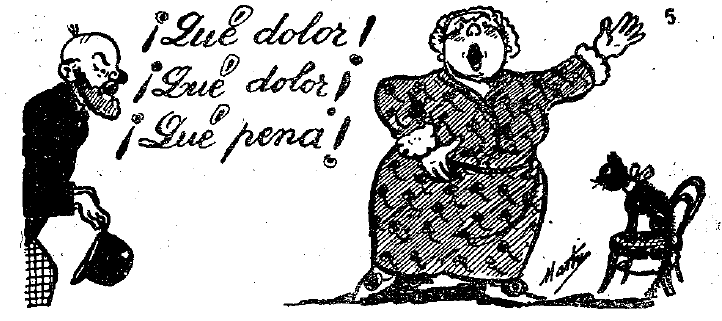
| Языки :: Испанский |
| Аудио |

 |
|
 |
|
15 |
Español |
Spanish |
|
Lección Quinta (5ͣ) |
||
| Buenos días, doctor (1) | Good day[s], doctor. | |
| 1 |
Mambrú se fué a la guerra. |
Marlbrough's a-going (was) the war(s), |
| 2 | Muy bien, doña Clara. ¡Qué alegría! | Very well, Mrs. Clara, what gaiety ! |
| 3 | ¿Es usted, doctor? ¡Buenos días! Usted viene muy tarde (3). |
Is (that) you [your honour], doctor? Good day[s] ! You come very late. |
| 4 | Dispense; no he podido venir antes;
he tenido una operación muy delicada. |
Excuse (me), (I) have not been able to come before; (I) have had [held] a very delicate operation. |
| 5 | ¿Ha terminado bien? | Has (it) ended well? |
| 6 | Creo que sí; pero no lo puedo saber seguramente antes de dos o tres días. ¿Qué hay de nuevo? (4). |
(I) think so [that yes]; but (I) cannot know it surely before [of] two or three days. What's new [what has of new]. |
| 7 | He recibido una carta de mi marido (5). | (I) have received a letter from [of] my husband. |
| EXERCISE : | ||
| 1 | ¿Cuando vendrá tu amigo? - No lo sé. |
When will you friend come? |
| 2 | ¿Cuando vendrá usted? - Vendré muy tarde. |
When will you [your Honour] come? (I) shall come very late. |
| 3 | ¿Qué ha recibido usted? - He recibido una carta. |
What have you [has your H.] received? - (I) have received a letter. |
| 4 | El doctor no ha podido venir. | The doctor has not been able to come. |
| 5 | Creo que vendrá después. - Espero que sí. |
(I) think that (he) will come later. - (I) hope so [that yes]. |
|
Don't be afraid by the use of Usted; |
| NOTES. | |
| 1 |
Buenos diás is literally
good days, plural. |
| 2 |
"Malbrouck 's a-going to the wars ", the famous popular
French song, brought into Spain by Napoleon's armies, |
| 3 |
Usted is the contraction of Vuestra merced (vooestra
maircay) : your mercy, your grace. |
| 4 | Hay (a-ee) means there is or is there according to the meaning of the sentence. |
| 5 |
Mind! |
